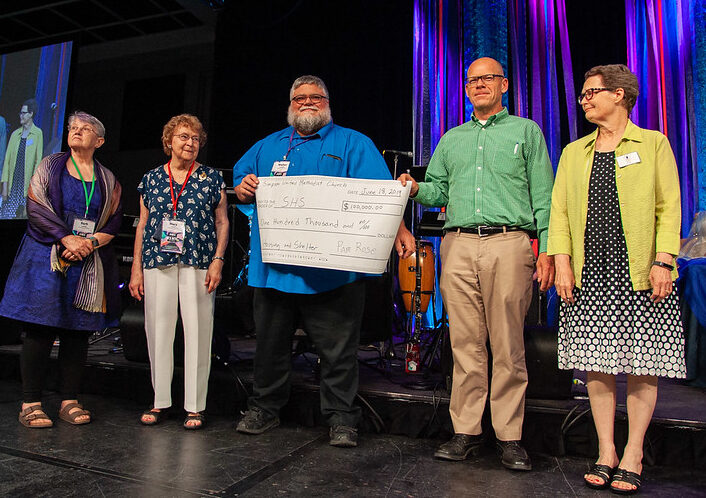Church Provides Housing Through Closure
Church Provides Housing Through Closure
By Caleb Rollins
December 2021
How did a 140-year-old congregation in the heart of south Minneapolis decide to close their congregation and donate their property to a nonprofit that serves people experiencing homelessness? The story begins with conversation over a cup of coffee.
In early 2016, Walter Lockhart IV of Simpson United Methodist Church; Dan Johnson, Twin Cities district superintendent of the United Methodist Church Minnesota Annual Conference; and Steve Horsfield, executive director of Simpson Housing Services, met to dream about possible futures for the old church building.
Like countless urban mainline Protestant congregations, Simpson UMC saw stark decline over the final decades of the twentieth century. This diminishing membership was matched by a deteriorating building. “The building is disintegrating around us. It is deteriorating from its own weight,” says longtime member Mary Gates.
The congregation had attempted to address these challenges head-on and experimented with different ministry models. One model brought them into a relationship with Iglesia Piedra Vida, a Hispanic congregation that used the building as a place for spiritual growth and community engagement. Another model spurred the development of a food pantry for community members, especially those served by Simpson Housing Services.
Yet, despite these creative new partnerships and programs, the congregation continued to decline, and the building’s needs went unaddressed. “The season for having a sanctuary in south Minneapolis that seats five hundred people is over,” says Rev. Lockhart. “It’s time to open the door to new possibilities.” Members knew they needed to close, but they wanted to use their assets to spark something new. To find these new paths, Simpson UMC turned to an old partner.
Simpson Housing Services began as a dream of a former member who felt called to respond to the growing problem of homelessess in Minneapolis in the early 1980s. From an invitation to provide shelter for their unhoused neighbors came the creation of a separate nonprofit, Simpson Housing Services, that now serves more than five hundred individuals and two hundred families through sheltering, advocacy, and other supportive services.
Since Simpson Housing Services was running their shelter out of the Simpson UMC basement, this trusted nonprofit seemed a logical partner for the building’s next chapter. Through congregational and community meetings, the people of Simpson UMC decided to close their congregation and donate their property to Simpson Housing Services, which plans to construct a new building on the site for shelter, permanent supportive housing, and other services.
Rev. Johnson, who aided in the discernment process, described some of the challenges Simpson UMC faced in these periods of transition. “How do you communicate in a way that is honest and transparent and at the same time doesn’t contribute to rumors? Casting vision across a broad population and constituency takes time.”
While the decision to end the congregation and pass on the property to Simpson Housing Services became official in the summer of 2017, the process of constructing the new building is ongoing. Challenges from zoning and other municipal laws have slowed progress, and while Simpson UMC and other local Methodist congregations have donated to the project, Simpson Housing Services has had to patch together a funding package from other private and public sources. They plan to complete the project in 2023, providing the community with permanent supportive housing and a shelter on the same site where the organization began forty years ago.
In their closing chapter, Simpson UMC also continued to support some of their more recent partners. They felt compelled by the mission of Iglesia Piedra Vida and donated a portion of their remaining endowment funds to the congregation. Furthemore, the food pantry they began will live on in the new Simpson Housing Services building.
The process of decline, discernment, and transition took time to unfold, but the people of Simpson UMC continued to put their trust and support in their community partners, new and old. According to Rev. Johnson, they found joy in knowing their ministry would live on. “While they mourned the departure from that site,” notes Johnson, “they also celebrated that it wasn’t just a closure and an end to their name, work, and witness, but it would be reimagined and repurposed in new ways.”
This story is part of Lake Institute’s story collection, the Faithful Generosity Story Shelf, which highlights congregations and other religious organizations who have sought to use their assets and resources in creative—and sometimes surprising—ways as an expression of faithful giving.
Each entry in our Story Shelf is short enough to be read and discussed during a committee meeting or other group gathering. Our hope is that these accessible vignettes will spark new questions, conversation, and imagination among clergy and laity about what might be possible with the funds, buildings, land, and other resources in their care. If you know a story that should be included in the Story Shelf, suggest it here.
Subscribe
Insights, a bi-weekly e-newsletter, is a resource for the religious community and fundraisers of faith-based organizations that provides:
- Reflections on important developments in the field of faith and giving
- Recommended books, studies and articles
- Upcoming Lake Institute events

